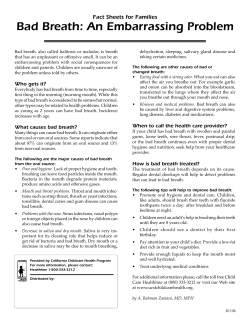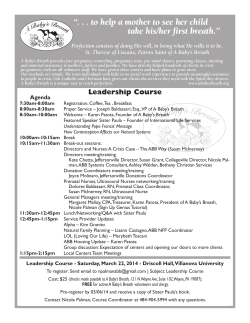
Why the voice is so important
Why the voice is so important As soon as we open our mouths to speak we are judged - assumptions can be made about us, our intelligence, determination, confidence and power. We are ‘placed’ by our listeners and sometimes we do this to others too. The minute we speak – our tone, pitch, quality of articulation inflexions – send out subtle messages about the kind of person we are – our mood and our feelings at that particular time. Being able to project the ‘right sound’ can make a vital difference to the way we are perceived and treated . Used properly the voice can work for us in our personal relationships also, of course, in our business and professional life. It can be said that the voice is the primary link between the mind and the body therefore if you have a positive mindset, an awareness of posture and a basic knowledge of how the voice works – you have the potential to exercise far more control thus speaking effectively, effortlessly and with confidence. Content First of all if you have been asked to do something – open a meeting- give a short speech whatever, it is quite obvious someone has faith in your abilities and respects you so think of this – hold this thought in your head whilst you prepare and before you open your mouth. . Be sure of your brief – what have you been asked to do – if you are uncertain ask for clarification. If it is your choice and decision - make certain you are sure as to the purpose, content and audience Only then can you work on HOW you are going to put your material across and use your voice. Performance Wear something comfortable – smart, of course, but not restrictive – avoid tight belts, collars or very high heels which can thrust the spine forward. You may feel vulnerable and in doubt but your audience will not automatically perceive that from the outset – quite the contrary, actually.remember you are the speaker and because of that very fact – you begin with credibility from the listener’s point of view. Show that you are comfortable and enjoying the experience even if you are anxious – control the fear and nerves - a little anxiety is natural and good in that a little adrenalin can drive us to prepare well, focus and to a degree, monitor our performance. Your audience will feel confident that you are in control so remember this as you approach the task and during your performance. Pay attention to your posture - make sure your spine is not too straight but not too slumped either. The lungs need to be supported to enable adequate breath support – whether standing or sitting. So a balanced, long but free spine is essential. Check that the head is not thrusting forward and the shoulders are not raised with tension as you speak. Speak with a relaxed jaw and use the tongue and lips freely – bring the sounds forward. Make the words you use work for you, words have a natural energy and life which comes from the vowels and consonants. Articulate these clearly and your speech will have a clarity, force and energy. Avoid letting the ends of words or sentences fade away. Connect with what you are saying – let your facial expression, eye contact and body language compliment your message. Think positive and your tone will be confident; your pace and pitch will vary naturally Vocal Care and Awareness If your talk or presentation is quite demanding, warm up or incorporate regular warm ups in you daily routine. In bed, on waking, begin with a BIG stretch. Enjoy an (un-stifled) yawn to open the throat and exercise the jaw. Take a deep breath followed by a BIG (audible) sigh! Sip some water (do this before drinking anything hot). Yawn again to an ‘AH’ sound – to raise the soft palate and open the throat). Hum or sing in the bath or shower to warm up the larynx. With an easy jaw and comfortable breath supply, say something that exercises your muscular agility.(Articulation) a tongue twister i.e. as below: All I want is a proper cup of coffee made in a proper copper coffee pot Red lorry, yellow lorry, red lorry, yellow lorry. Mixed biscuits, mixed biscuits To the tune of the ‘William Tell Overture’ Many men, many men, many men, men men! (nasal resonators) Many men, many men, many men, men men Say on the way to work, in the car, during the day – whenever. Let the tone of your voice reflect a very positive mood. If you use your voice frequently for long periods every day make sure you drink adequate amounts of water to keep the vocal cords moist. Rest your voice when you can – even if only for short periods Limit alcohol intake, spicy foods, dairy produce and, of course, cigarette smoke After strenuous or extended voice use also during the evening, if you’ve been watching TV or concentrating hard on paperwork – stop – stretch, roll the shoulders and give your head a gently shake. This will release upper body tension. Do a little downward humming, a few notes only to relax the voice. Sleep with unclenched and relaxed jaw. Evaluation If you felt unhappy about a your performance – again ask yourself honestly why was that the case? Did you omit certain points, did you fail to quote or give specific facts and figures? Did you feel you were awkward ? . Chances are the audience were not aware of any of these things; the effect you have on the audience is the most important factor. If you were speaking in a meeting or in a “one to one” situation - did you fail to express your own view in the way you had intended? Don’t over analyse or intimidate yourself but consider how you might improve next time – more controlled pace, more emphasis or confident tone., fewer distracting movements, clearer articulation or improved breath control. Be objective – but not over critical – you can improve. Whatever your goals or specific areas of concern – vocal health, performance or specific content – we can help you to enhance your voice and your personal and professional performance– contact us now, we can help!!!
© Copyright 2025





















